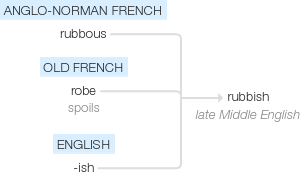Rubbish
late Middle English: from Anglo-Norman French rubbous ; perhaps related to Old French robe ‘spoils’; compare with rubble. The change in the ending was due to association with -ish1. The verb (1950s) was originally Australian and New Zealand slang.
wiktionary
From Middle English rǒbǒus(“rubbish, building rubble”), further origin uncertain; possibly from Anglo-Norman rubous, rubouse, rubbouse(“refuse, waste material; building rubble”), and compare Late Latin rebbussa, robousa, robusium, robusum, rubisum, rubusa, rubusium [1] (although the Anglo-Norman and Latin words may be derived from the English word instead of the other way around). The English word may be related to rubble, though the connection is unclear. [2]
The verb is derived from the noun. [3]
etymonline
rubbish (n.)
c. 1400, robous, "waste, broken, or worn-out material," especially "rubble from the demolition of a building, etc.," from Anglo-French rubouses (late 14c.), a word of unknown origin. There are said to be no apparent cognates in Old French; OED says "app. related in some way to rubble."
The spelling with -ish is from late 15c. As "any useless or worthless stuff" by c. 1600. The verb sense of "disparage, criticize harshly" is attested by 1953 in Australian and New Zealand slang. Related: Rubbished; rubbishing.
